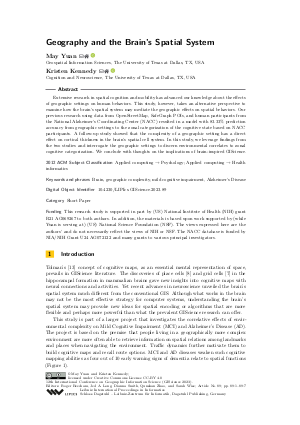Geography and the Brain’s Spatial System (Short Paper)
Authors
May Yuan  ,
Kristen Kennedy
,
Kristen Kennedy 
-
Part of:
Volume:
12th International Conference on Geographic Information Science (GIScience 2023)
Part of: Series: Leibniz International Proceedings in Informatics (LIPIcs)
Part of: Conference: International Conference on Geographic Information Science (GIScience) - License:
 Creative Commons Attribution 4.0 International license
Creative Commons Attribution 4.0 International license
- Publication Date: 2023-09-07
File

PDF
LIPIcs.GIScience.2023.89.pdf
- Filesize: 1.85 MB
- 7 pages
Document Identifiers
Subject Classification
ACM Subject Classification
- Applied computing → Psychology
- Applied computing → Health informatics
Keywords
- Brain
- geographic complexity
- mild cognitive impairment
- Alzheimer’s Disease
Metrics
- Access Statistics
-
Total Accesses (updated on a weekly basis)
0PDF Downloads0Metadata Views
Abstract
Extensive research in spatial cognition and mobility has advanced our knowledge about the effects of geographic settings on human behaviors. This study, however, takes an alternative perspective to examine how the brain’s spatial system may mediate the geographic effects on spatial behaviors. Our previous research using data from OpenStreetMap, SafeGraph POIs, and human participants from the National Alzheimer’s Coordinating Center (NACC) resulted in a model with 83.33% prediction accuracy from geographic settings to the zonal categorization of the cognitive state based on NACC participants. A follow-up study showed that the complexity of a geographic setting has a direct effect on cortical thickness in the brain’s spatial cell system. In this study, we leverage findings from the two studies and interrogate the geographic settings to discern environmental correlates to zonal cognitive categorization. We conclude with thoughts on the implications of brain-inspired GIScience.
Cite As Get BibTex
May Yuan and Kristen Kennedy. Geography and the Brain’s Spatial System (Short Paper). In 12th International Conference on Geographic Information Science (GIScience 2023). Leibniz International Proceedings in Informatics (LIPIcs), Volume 277, pp. 89:1-89:7, Schloss Dagstuhl – Leibniz-Zentrum für Informatik (2023)
https://doi.org/10.4230/LIPIcs.GIScience.2023.89
BibTex
@InProceedings{yuan_et_al:LIPIcs.GIScience.2023.89,
author = {Yuan, May and Kennedy, Kristen},
title = {{Geography and the Brain’s Spatial System}},
booktitle = {12th International Conference on Geographic Information Science (GIScience 2023)},
pages = {89:1--89:7},
series = {Leibniz International Proceedings in Informatics (LIPIcs)},
ISBN = {978-3-95977-288-4},
ISSN = {1868-8969},
year = {2023},
volume = {277},
editor = {Beecham, Roger and Long, Jed A. and Smith, Dianna and Zhao, Qunshan and Wise, Sarah},
publisher = {Schloss Dagstuhl -- Leibniz-Zentrum f{\"u}r Informatik},
address = {Dagstuhl, Germany},
URL = {https://drops.dagstuhl.de/entities/document/10.4230/LIPIcs.GIScience.2023.89},
URN = {urn:nbn:de:0030-drops-189847},
doi = {10.4230/LIPIcs.GIScience.2023.89},
annote = {Keywords: Brain, geographic complexity, mild cognitive impairment, Alzheimer’s Disease}
}
Author Details
Funding
This research study is supported in part by (US) National Institute of Health (NIH) grant R21 AG069267 to both authors. In addition, the materials is based upon work supported by (while Yuan is serving at) (US) National Science Foundation (NSF). The views expressed here are the authors' and do not necessarily reflect the views of NIH or NSF. The NACC database is funded by NIA/NIH Grant U24 AG072122 and many grants to various principal investigators.
References
-
Jiri Cerman, Andel Ross, Jan Laczo, Vyhnalek Martin, Nedelska Zuzana, Mokrisova Ivana, Sheardova Katerina, and Hort Jakub. Subjective spatial navigation complaints-a frequent symptom reported by patients with subjective cognitive decline, mild cognitive impairment and alzheimer’s disease. Current Alzheimer Research, 15(3):219-228, 2018.

-
Gregory D Clemenson, Antonella Maselli, Alexander J Fiannaca, Amos Miller, and Mar Gonzalez-Franco. Rethinking gps navigation: creating cognitive maps through auditory clues. Scientific reports, 11(1):1-10, 2021.

-
DP Devanand, G Pradhaban, X Liu, A Khandji, S De Santi, S Segal, H Rusinek, GH Pelton, LS Honig, R Mayeux, et al. Hippocampal and entorhinal atrophy in mild cognitive impairment: prediction of alzheimer disease. Neurology, 68(11):828-836, 2007.

-
Carles Falcón, Mireia Gascon, José Luis Molinuevo, Grégory Operto, Marta Cirach, Xavier Gotsens, Karine Fauria, Eider M Arenaza-Urquijo, Jesús Pujol, Jordi Sunyer, et al. Brain correlates of urban environmental exposures in cognitively unimpaired individuals at increased risk for alzheimer’s disease: A study on barcelona’s population. Alzheimer’s & Dementia: Diagnosis, Assessment & Disease Monitoring, 13(1):e12205, 2021.

-
Caleb E Finch and Alexander M Kulminski. The alzheimer’s disease exposome. Alzheimer’s & Dementia, 15(9):1123-1132, 2019.

-
Kevin Lynch. The image of the city. MIT press, 1964.

-
Edvard I Moser, Emilio Kropff, and May-Britt Moser. Place cells, grid cells, and the brain’s spatial representation system. Annu. Rev. Neurosci., 31:69-89, 2008.

-
John O'Keefe and Jonathan Dostrovsky. The hippocampus as a spatial map: preliminary evidence from unit activity in the freely-moving rat. Brain research, 1971.

-
Martina Parizkova, Ondrej Lerch, Scott Douglas Moffat, Ross Andel, Adela Fendrych Mazancova, Zuzana Nedelska, Martin Vyhnalek, Jakub Hort, and Jan Laczó. The effect of alzheimer’s disease on spatial navigation strategies. Neurobiology of Aging, 64:107-115, 2018.

-
Ruth Peters, Nicole Ee, Jean Peters, Andrew Booth, Ian Mudway, and Kaarin J Anstey. Air pollution and dementia: a systematic review. Journal of Alzheimer’s Disease, 70(s1):S145-S163, 2019.

-
Alberto Serrano-Pozo, Matthew P Frosch, Eliezer Masliah, and Bradley T Hyman. Neuropathological alterations in alzheimer disease. Cold Spring Harbor perspectives in medicine, 1(1):a006189, 2011.

-
Naewoo Shin. Investigating associations among geospatial environmental complexity, brain morphometry, and cognition across the alzheimer’s disease spectrum. Master’s thesis, Department of Cognition and Neuroscience, The University of Texas at Dallas, Richardson, Texas, USA, 2023.

-
Edward C Tolman. Cognitive maps in rats and men. Psychological review, 55(4):189, 1948.

-
May Yuan and Kristen M Kennedy. Utility of environmental complexity as a predictor of alzheimer’s disease diagnosis: A big-data machine learning approach. The Journal of Prevention of Alzheimer’s Disease, 10(2):223-235, 2023.

